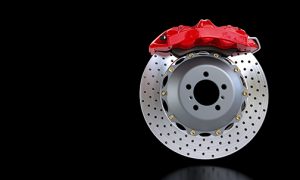Brake Calipers: What They Are and When to See a Mechanic in Williamsburg
Your car’s braking system has many moving parts—but brake calipers are at the heart of it all. Since calipers hold your brake pads and help create the friction needed to stop your wheels, they play a key role in your safety. Whether you’re commuting through Williamsburg or planning a trip to Williamsburg, healthy brake calipers help your vehicle stop quickly and smoothly.
At Meineke in Williamsburg, our ASE-certified technicians offer brake inspections, caliper servicing, and full brake system repairs to keep you safe on the road. So, in this post, we’ll explain what brake calipers are, how they work, why they matter, how to maintain them, and when to see a mechanic.
What Is a Brake Caliper and How Does It Work?
A brake caliper is a clamp-like part that fits over the brake rotor and holds your brake pads. Since most cars today use disc brakes, calipers are part of the disc braking system. When you press the brake pedal, brake fluid flows through the lines and pushes pistons inside the caliper. Then, those pistons press the brake pads against the rotor to create friction—and that friction stops your wheels.
Because calipers are exposed to heat, moisture, and road debris, they need to stay clean and fully functional to do their job.
Why Are Brake Calipers So Important?
Although they may seem like a small piece of the system, brake calipers are essential for proper braking performance.
-
Stop your car safely – If the caliper works properly, then your brake pads can grip the rotor and slow your wheels.
-
Prevent uneven braking – If both calipers are working evenly, then your car won’t pull to one side.
-
Protect your rotors and pads – If calipers engage and release correctly, then your pads wear evenly and last longer.
-
Ensure fast stopping power – If calipers react quickly, then your car can stop faster in emergencies.
-
Support overall brake health – If calipers are maintained, then the rest of your brake system runs smoothly.
How to Maintain Your Brake Calipers
Even though calipers are durable, routine care helps them last longer and perform better.
-
Flush your brake fluid regularly – If fluid is clean, then pistons move smoothly inside the calipers.
-
Inspect for leaks or sticking parts – If you see brake fluid near your wheels, then a caliper seal may be worn.
-
Listen for grinding or squealing – If calipers stick, then your pads may drag and wear out early.
-
Watch for uneven pad wear – If one pad is thinner than the others, then the caliper may not be applying pressure evenly.
-
Get brake service with every oil change – If you catch problems early, then you’ll avoid costly repairs.
When to See a Mechanic in Williamsburg
Brake caliper issues can lead to poor performance or dangerous driving conditions. Visit Meineke in Williamsburg if:
-
Your car pulls to one side when braking
-
You hear squealing, grinding, or rubbing sounds
-
You notice a burning smell near the wheels
-
Your brake pedal feels soft, stiff, or unresponsive
-
You see brake fluid leaking around the tires

So, Call Meineke in Williamsburg Today for a Brake Inspection
Since brake calipers are essential for safe stopping, keeping them in good condition is critical. But if your car pulls to the side, your brakes feel off, or you hear odd noises while braking, Meineke on Second Street in Williamsburg is ready to help. Whether you need a brake system inspection, caliper repair, or a full brake service, our ASE-certified team will make sure you stop safely every time. So, don’t take chances with your brakes—call Meineke in Williamsburg today for a quick check-up.
If the Meineke in Williamsburg is not convenient, also check out these other locally-owned Meineke locations in Virginia:
- Meineke Virginia Beach #197
6399 Indian River Road
Virginia Beach, VA 23464-3500
Call (844) 768-6004 - Meineke Virginia Beach #312
1837 Laskin Road
Virginia Beach, VA 23454-4504
Call (833) 696-8494 - Meineke Virginia Beach #2739
1321 Diamond Springs Rd
Virginia Beach, VA 23455
Call (757) 687-0566 - Meineke Virginia Beach #2883
3700 Holland Rd
Virginia Beach, VA 23452
Call (757) 932-2952 - Meineke Charlottesville #342
1906 Emmet Street
Charlottesville, VA 22901-2815
Call (855) 747-2083 - Meineke Hampton #584
79 West Mercury Boulevard
Hampton, VA 23669-2508
Call (757) 690-7689 - Meineke Yorktown #851
4609 George Washington Memorial Highway
Yorktown, VA 23692-2766
Call (757) 847-9155 - Meineke Williamsburg #938
399 Second Street
Williamsburg, VA 23185
Call (757) 585-4492 - Meineke Denbigh #1088
415 Oriana Road
Newport News, VA 23608
Call (757) 814-2724 - Meineke Richmond #2514
5271 S Laburnum Avenue
Richmond, VA 23231
Call (804) 222-2862
